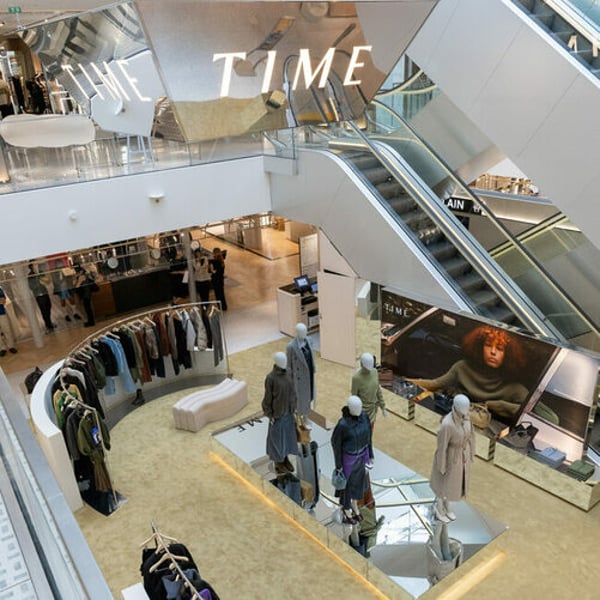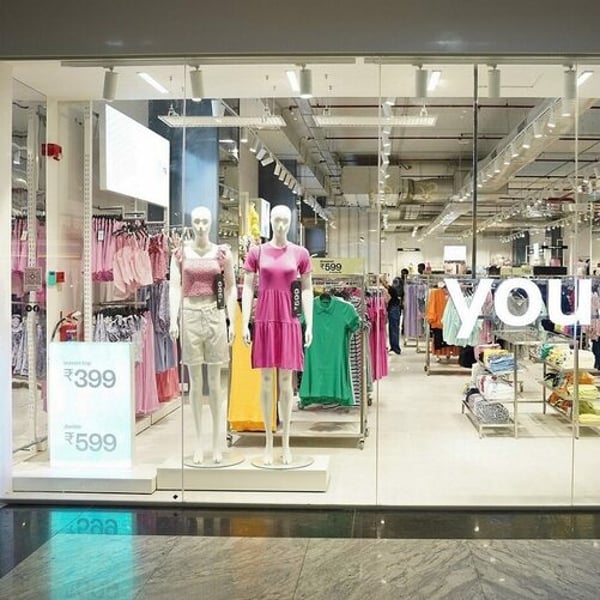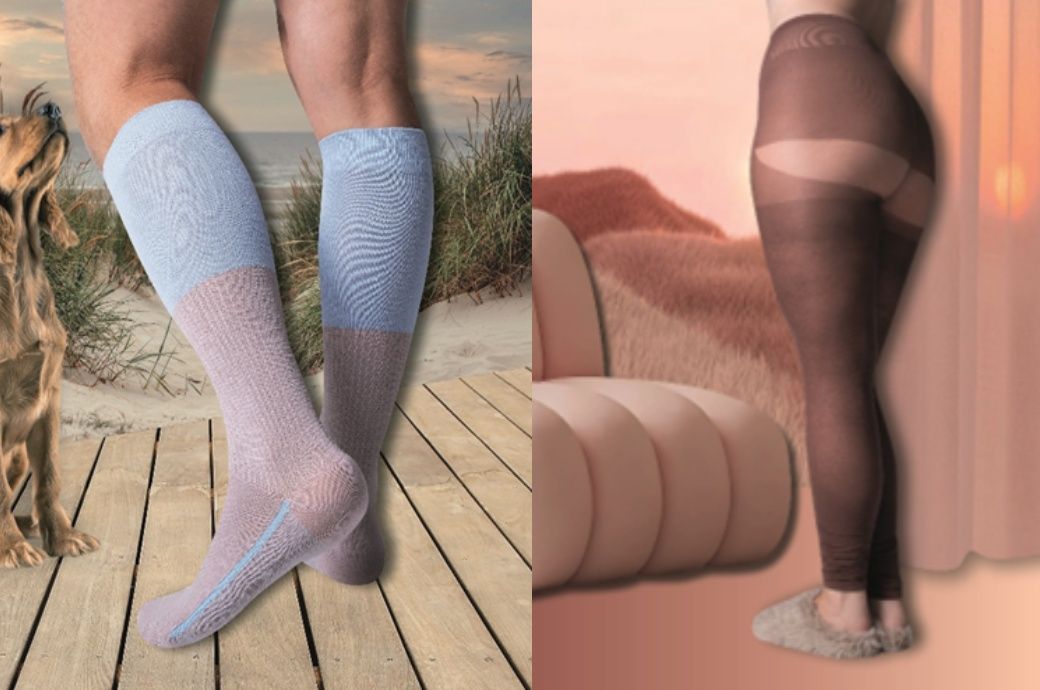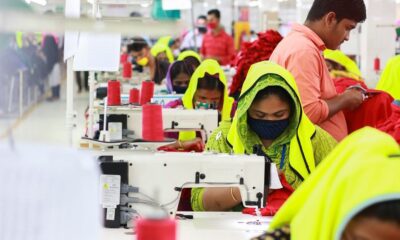Fashion
South Korean brand Time tests the French market at La Samaritaine

Published
September 3, 2025
La Samaritaine is testing out new fashion propositions in its spaces, and it’s the South Korean label that’s taking over the atrium to introduce its sleek, feminine looks to customers of the Parisian department store. The brand, born in 1993, has set up a 62-square-meter pop-up store on level -1, open from August 30 until October 30. Two months of experimentation in the French market, where Time began to parade in 2023 during Paris Fashion Week (starting at the Palais de Tokyo).
This temporary store is part of a global expansion plan for the brand, which intends to extend its footprint beyond its own borders. In a setting enhanced by metallic surfaces, an olive-green carpet and curvaceous furniture, the Fall-Winter 2025/26 collection features rounded jackets, muted knits and numerous shawls, “particularly popular in Korea,” according to the company.
Time, whose artistic director is Jung in Choi, will parade again in the French capital in a month’s time, to present its spring/summer 2026 collection. Afterwards, the company aims to open its first permanent boutique in Paris.

The Time brand belongs to the Korean Handsome group, launched in 1987, which owns or operates some forty ready-to-wear labels, cosmetics labels and lifestyle brands (in-house and under license). It has a network of 1,300 outlets and is itself owned by the Hyundai Department Store Group.
This article is an automatic translation.
Click here to read the original article.
Copyright © 2025 FashionNetwork.com All rights reserved.
Fashion
Reliance misses third-quarter profit estimates at $2.06 billion for the October-December quarter

By
Reuters
Published
January 19, 2026
On Friday, India’s Reliance Industries posted an 186.45 billion rupees ($2.06 billion) profit for the October-December quarter, missing analysts’ average estimate of 196.44 billion rupees, according to data compiled by LSEG.
Shares of Reliance Industries fell as much as 2.7% in early trade on Monday after the conglomerate announced missing its third-quarter profit estimates, weighed down by slowing earnings growth in its retail segment. Shares of the Mukesh Ambani-led firm were trading at 1,426. 60 rupees, as of 9:41 am, and were among the top five losers on the benchmark Nifty 50 Index
UBS analysts trimmed Oil-to-Chemicals(O2C) and retail estimates slightly but said they still see room for a valuation re-rating, as the company’s earnings before interest and taxes (EBIT) mix increasingly shifts toward structural growth drivers such as digital and retail, reducing dependence on the cyclical oil and gas segment. Festive discounting, investment in hyper-local delivery startups, and a one-off impact from India’s new labour code trimmed core margins at its retail unit to 8% from 8.6% a year earlier.
Retail growth softened primarily because the festive season was brought forward and due to the one-month impact of the consumer products demerger, analysts at Emkay said. Core earnings for the segment grew 1.3% to 69.15 billion rupees, compared with 9.5% growth a year earlier.
Reliance’s oil and gas segment weakened due to lower output and softer price realisations from its ageing KG-D6 fields, leading to an 8.4% revenue decline and a 12.7% drop in core earnings amid higher maintenance costs. Meanwhile, analysts at Systematix forecast a rise of 5%, 12%, and 9% O2C, Retail, and Jio revenue CAGR, respectively, during FY25-FY28, while a 12% decline in their oil and gas businesses.
© Thomson Reuters 2026 All rights reserved.
Fashion
Milan Menswear: a changing of guard and gears at Giorgio Armani

Published
January 19, 2026
There was a changing of the guard and of gears at Giorgio Armani Monday morning, as Leo Dell’Orco presented a smooth and chic debut collection for the house, the final important show of Milano Uomo Moda.
The collection was the first not designed for the house by eponymous designer Giorgio Armani, who passed away in September last year.
Inevitably, Dell’Orco, Giorgio Armani’s right-hand man for the past four decades, sent out a collection that was hyper respectful of the master’s DNA. Yet he still added his own imprint to a signature collection that featured over a dozen women’s looks that practically matched the menswear designs they marched beside.
Leo also upped the pace of the show, which was no bad thing, and concentrated on what the house of Armani does best- impeccable, fluid tailoring. Most notably with some excellent jackets and blazers. Varying between one-button blazers with elongated shawl lapels made in the house’s signature non-colours of mud, cement, or wheat. To five-button Nehru jackets, again riffing on old Giorgio favourites- from zig zag pattern to waffle style. Paired with forgiving tapered pants that nipped at the ankle it all made for a very flattering silhouette.

Leo did break new ground in terms of colours, showing some great olive green or amethyst velvet shirts, pinstripe jackets and coats- for men and women. Along with superb silk mandarin jackets in dashing Colombia blue. While Giorgio’s love of Asian design was remembered in a great series of silk shirts with high smoking collars.
A change of guard also on the board, where recently appointed members John Hooks and Marco Bizzarri sat smiling in the audience.
“It feels emotional to be back after 15 years,” commented Hooks, the house’s managing director for a decade until 2011. While a beaming Bizzarri predicted: “expect an exciting 18 months at the house of Armani.”
As noted, under the terms of Giorgio Armani’s will, the childless late designer left instructions that his heirs sell 15% of the house within 18 months of his death. And then a further 35% to 54.9% to the same buyer.

However, after watching this show, one got the distinct impression that no one in Armani is in any great hurry to sell.
Clearly enjoying his new role, Dell’Orco took a few risks with his choice of coats, showing dramatic double-face slate grey topcoats with funnel necks, or the sleekest meeting of a chauffeur’s tunic and long coat in putty grey. One could sense the models loved wearing them, too.
In another marked change, the models appeared quicker and marched faster in two morning shows, held in the famed Armani show-space in the basement of Giorgio’s personal palazzo on central Via Borgonuovo.
The collection and show did lose focus towards the finale, with some odd knits and a good deal or repetition. It lacked the ruthless self-editing for which King Giorgio was famous. But overall, this felt like a successful passage into a new era, and a win for the house.

In a generous gesture, Leo took his bow with his nephew Gianluca Dell’Orco, a design director for menswear.
Bowing, smiling, and ebullient- aided by the galactic funk and gentle techno soundtrack, including Evolver by AstroMat. Armani soundtracks traditionally had been one of Leo Dell’Orco’s responsibilities.
And one could not help to chant during the show “Ashes to Ashes,” the traditional refrain at funerals, suggesting there is a future life immortal in heaven.
Copyright © 2026 FashionNetwork.com All rights reserved.
Fashion
The LYCRA Company reveals legwear innovation concepts for 2026/27

The LYCRA Company, a global leader in fibre and technology solutions for the apparel industry, announces its latest collection of legwear innovation concepts for the 2026/27 season. Developed in collaboration with trend forecasters at Stijlinstituut Amsterdam, the collection explores how people live, dress, and express themselves, presenting four inclusive lifestyle categories: Work/School, Sport, Chill, and Going Out.
The LYCRA Company unveils its 2026/27 legwear innovation concepts, developed with Stijlinstituut Amsterdam, built around inclusive lifestyles: Work/School, Sport, Chill and Going Out.
Moving beyond demographics, the collection blends performance, comfort, sustainability and self-expression, with fibre innovations designed to adapt to all ages, genders and styles.
These categories move away from traditional demographics and instead embrace inclusivity across age, gender, and style. Whether it is a teenager in uniform, an adult balancing work and fitness, or a style-forward consumer expressing glamour at any age, LYCRA fibre innovations provide solutions that adapt to the wearer’s unique needs.
“This year’s innovation concepts reflect the diversity of consumers’ lives and the inclusivity of modern legwear. We have created versatile, sustainable solutions that perform across lifestyles and support people of all ages, genders, and style preferences,” said Jane Gwyther, Global Product Director – Legwear
WORK/SCHOOL
Everyday resilience, for every age and style.
The Work/School category highlights versatility and practicality essential for everyday life, not just the boardroom or classroom. This is about garments that withstand repeated wear, hold their shape, and provide energizing comfort that lasts. From young students to adults who favour practical staples, this category offers styles that balances function and fashion for a broad audience.
Key innovations include:
- COOLMAX EcoMade fibre, made from 100% pre-consumer textile waste, provides permanent cool and dry comfort throughout the day for garments that stay in place.
- LYCRA STEAM-SETTABLE fibre ensures garments retain their shape and uniform appearance, wash after wash.
- LYCRA ENERGIZE powered by LYCRA FUSION brand offers graduated compression to revitalize legs, with the added benefit of run-resistance, comfort and durability.
Together, these fibres create socks and hosiery that stay in place, maintain their shape, and keep wearers comfortable throughout their day. This balance of durability, comfort, and sustainability makes the Work/School category inclusive of all ages and genders, ensuring practical solutions for daily wear.
GOING OUT
Bold expression meets technical confidence.
The Going Out category celebrates individuality, glamour, and the power of self-expression. Designed for consumers of all ages and genders who embrace fashion that combines aesthetic impact with technical reassurance. From understated elegance to bold statement looks, these garments empower wearers to express themselves confidently.
Key innovations include:
- LYCRA EcoMade fibre, made from renewable raw ingredients, offers the same trusted performance with ISCC Certification, an innovation for the sustainably minded fashion lover.
- LYCRA FUSION TRUE TO YOU garment, delivering run-resistant confidence with a luminous, natural finish that enhances the appearance of legs.
- LYCRA STEAM-SETTABLE fibre enhances garment aesthetics by delivering a smooth, uniform silhouette with a 360-degree fit. It ensures hosiery maintains its shape and size wash after wash, giving wearers the confidence of a lasting, polished appearance.
With innovations that reduce ladders and runs, enhance shine, and adapt to multiple body types, Going Out ensures style and inclusivity go hand in hand, this category brings confidence to everyone who chooses to stand out.
CHILL
Comfort first, for moments of pause.
The Chill category focuses on relaxation and downtime, recognising that comfort is universal. Whether it is a teenager unwinding after school, a parent balancing work and family, or an older adult seeking ease of wear, Chill garments provide inclusive solutions that adapt to life at home, leisure, or casual socialising.
Key innovations include:
- LYCRA XCEPTIONELLE garment, featuring a patented construction with anti-friction zones and powered by LYCRA ADAPTIV fibre, ensures an inclusive fit across all body types and sizes for optimum comfort.
- THERMOLITE Everyday Warmth garment, made with THERMOLITE EcoMade fibre, delivers lightweight insulation for breathable warmth on cooler days, helps to stay in place and reduce red marks.
- LYCRA SOFT COMFORT fibre offering light-weight warmth, helps socks in place while reducing red marks and enhancing all-weather wearability.
This combination makes Chill the category for everyone, offering effortless, inclusive comfort that adapts seamlessly to diverse lifestyles.
SPORT
Performance-driven solutions for everybody.
The Sport category celebrates movement in all its forms from elite athletes to casual fitness enthusiasts, and across all genders, ages, and body types. It is designed for consumers who value functionality, durability, and technical support to enhance their performance and recovery.
Key innovations include:
- LYCRA ENERGIZE brand with LYCRA ADAPTIV fibre, delivering graduated compression to revitalise tired legs and energise performance, making them easy to put on and take off and offers a wider fit window.
- LYCRA XTRA LIFE brand, providing ultra-light durability and extended wear, ensuring garments retain their shape and strength through repeated use.
- LYCRA FUSION fibre, reducing ladders and runs to extend wear life, offering lasting confidence during high-intensity activity.
From compression hosiery that supports circulation to resilient socks that maintain shape through workouts, Sport highlights inclusivity through adaptable performance solutions. It ensures that every wearer, regardless of age, fitness level, or gender, can access high-quality legwear that empowers their movement.
Seasonal Colour Direction
The 2026/27 palette reflects the diversity of these four lifestyles.
- School/Work, calm neutrals and versatile blues convey trust and reliability, accented with soft pastels for youthful energy.
- Sport is energised by dynamic shades of burgundy, khaki, and black, balanced with performance-inspired brights.
- Chill embraces earthy tones of greens, teals, and warm neutrals, designed for relaxation and harmony.
- Going Out shines in rich jewel tones, luminous sheers, and high-impact contrasts empowering bold self-expression.
Conclusion
By reframing its 2026/27 concepts into the categories of School, Sport, Chill, and Going Out, The LYCRA Company demonstrates how legwear innovation is not only about fibres but about people. Each concept reflects inclusivity across age, gender, and style, while advancing sustainability and performance.
Note: The headline, insights, and image of this press release may have been refined by the Fibre2Fashion staff; the rest of the content remains unchanged.
Fibre2Fashion News Desk (HU)
-

 Tech7 days ago
Tech7 days agoNew Proposed Legislation Would Let Self-Driving Cars Operate in New York State
-

 Sports1 week ago
Sports1 week agoClock is ticking for Frank at Spurs, with dwindling evidence he deserves extra time
-

 Entertainment6 days ago
Entertainment6 days agoX (formerly Twitter) recovers after brief global outage affects thousands
-

 Fashion1 week ago
Fashion1 week agoSouth India cotton yarn gains but market unease over US tariff fears
-

 Fashion1 week ago
Fashion1 week agoChina’s central bank conducts $157-bn outright reverse repo operation
-

 Sports1 week ago
Sports1 week agoUS figure skating power couple makes history with record breaking seventh national championship
-

 Sports4 days ago
Sports4 days agoPak-Australia T20 series tickets sale to begin tomorrow – SUCH TV
-

 Entertainment1 week ago
Entertainment1 week agoFive killed in road accident in Khyber
















